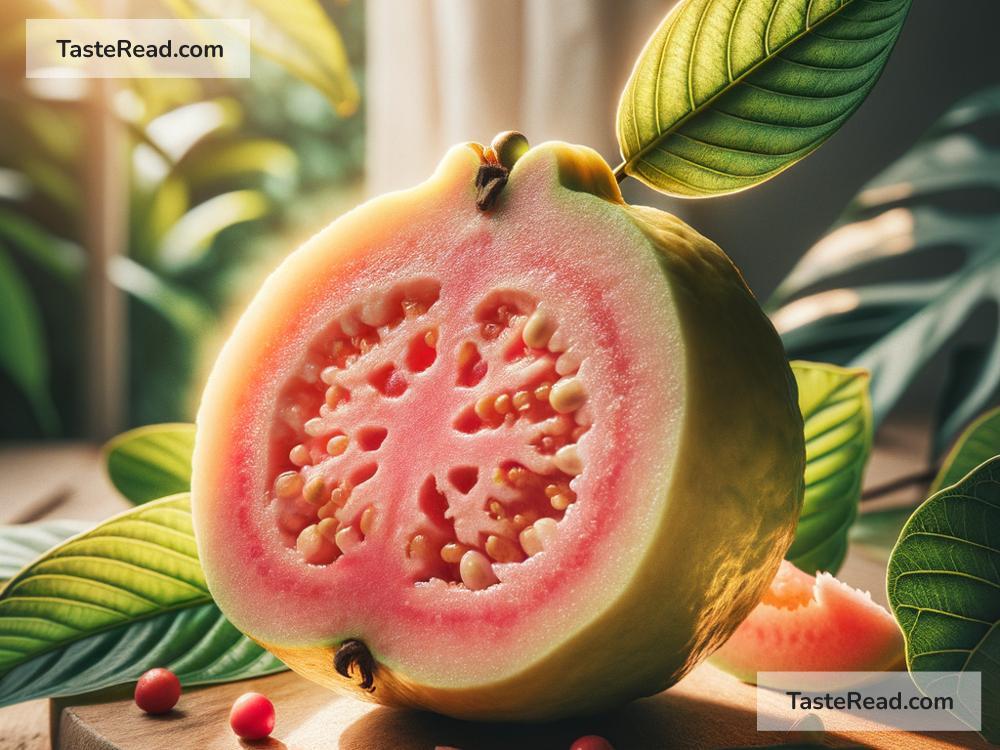The Mystery Behind Guava’s Tropical Aroma
Have you ever bitten into a ripe guava and been instantly transported to a tropical paradise? That incredible, sweet aroma of guava is unlike any other fruit. It fills the air, reminding us of sunny beaches, warm breezes, and lush green landscapes. But what makes guava smell the way it does? Why does it have such a distinct tropical essence? Let’s dive into the fascinating science and mystery behind guava’s irresistible aroma—and explain it in simple terms.
What Is Guava?
First, let’s talk about the fruit itself. Guava is a small, round or oval fruit native to tropical and subtropical regions. It’s commonly grown in countries like India, Mexico, Thailand, and Brazil. Guavas come in different varieties, with some having pink flesh, others white, and some even a yellowish tinge.
The beauty of guava lies in not only its taste but also its remarkable fragrance. Its smell is so unique that it’s often used in perfumes, air fresheners, and even flavorings for food. But what’s the secret to that tropical scent? It’s all about science!
The Source of Guava’s Aroma: Compounds and Chemistry
The aroma of guava comes from tiny chemical compounds hiding inside the fruit. These are often referred to as “volatile compounds” because they can evaporate easily and spread through the air. When you slice open a guava or even hold one close to your nose, these compounds are released, and your sense of smell picks them up.
Scientists have studied guavas to figure out exactly which compounds are responsible for its smell. Some of the key ones include:
-
Esters: Esters are a group of chemicals responsible for fruity and sweet aromas. In guava, they contribute to its candy-like scent. If you’ve smelled the flavor of pears, apples, or bananas, you’ve experienced the effect of esters before.
-
Terpenes: Terpenes are chemicals commonly found in plants that often produce floral or citrus-like smells. Guava’s tropical fragrance can partly be credited to terpenes. These compounds add a bright, zesty character to the fruit.
-
Alcohols: Certain alcohols in guava give it a fresh, green smell. This is why guava not only smells sweet but also reminds you of the outdoors, like the smell of plants or cut grass.
Together, these compounds work in harmony to create guava’s signature aroma. Scientists and food experts sometimes call this a “complex profile” because it involves many different elements combined into one amazing scent.
Why Does Guava Smell So Tropical?
Guava has earned its reputation as the “essence of the tropics.” But why does its smell make us think of tropical places like Hawaii or the Caribbean? It’s largely because of the chemical compounds we just talked about—and how our brains interpret them.
When we smell guava’s fruity and floral notes, our brains associate these smells with warm climates, sunny weather, and lush greenery. That’s because similar compounds are found in other tropical fruits like mangoes, pineapples, and passion fruits. These associations make guava feel like a little slice of the tropics, even if you’re far away from the nearest palm tree.
How Does Ripeness Impact the Smell?
If you’ve ever eaten guava, you probably noticed that its aroma is stronger in some fruits than others. A fully ripe guava smells much sweeter and more intense than one that is not yet ripe. This happens because, as the fruit ripens, it produces more of those volatile compounds we talked about earlier.
In the early stages, guava might smell grassy or slightly sour. But as it ripens, the esters, terpenes, and alcohols multiply and become more prominent, creating a powerful, mouthwatering aroma. This is why fruit vendors and farmers often wait to harvest guavas when they’re ripe—to ensure maximum flavor and fragrance.
Does Guava’s Smell Affect Its Taste?
Yes! Guava’s smell is closely linked to its taste. When you eat guava, you’re not just tasting the flesh of the fruit—you’re also “tasting” its aroma. A large part of how we experience flavor comes from our sense of smell. That’s why fruits that don’t have much aroma can taste bland, while guava feels vibrant and flavorful.
Its tropical aroma combines perfectly with its sweet and slightly tangy taste, creating an experience unlike any other fruit.
Fun Facts About Guava’s Aroma
- Guava’s aroma is so captivating that scientists have tried to replicate it in labs for perfumes, candies, and beverages.
- The leaves of guava plants also have a fragrance that contains some of the same compounds as the fruit.
- Guava smells different depending on the variety—some are more floral, while others are more citrusy.
Final Thoughts
The tropical aroma of guava isn’t just about its sweetness—it’s a mix of science, nature, and chemistry. The perfect blend of esters, terpenes, and alcohols creates a magical scent that makes guava one of the most beloved fruits. Whether you’re eating it fresh, drinking guava juice, or even sniffing guava-scented candles, this fruit has an amazing way of making us feel connected to the tropics.
So the next time you enjoy a guava, take a moment to appreciate its fascinating aroma—and remember, it’s more than just a smell; it’s a little tropical escape tucked inside a fruit.


